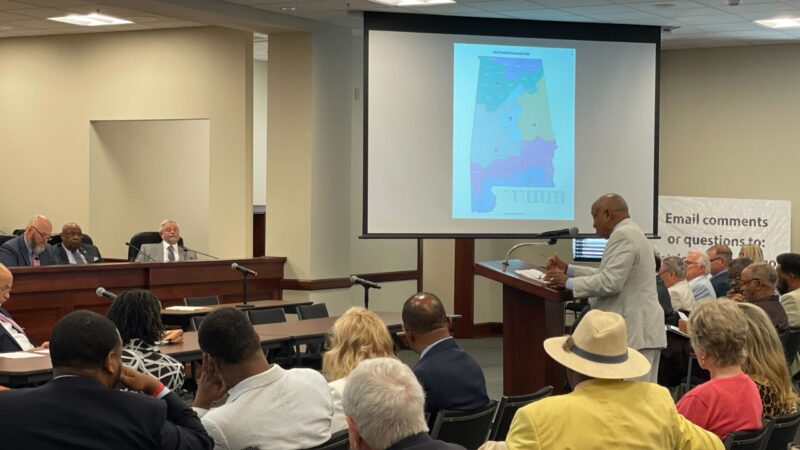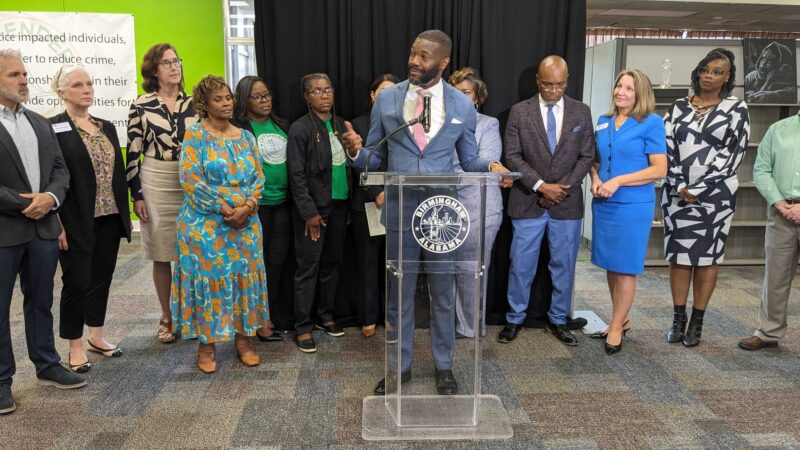Lawmakers begin redrawing Alabama’s congressional map
Chairman of the Alabama Democratic Conference, Joe Reed, spoke at a Reapportionment Committee public hearing on June 27, 2023.
The effort to redraw Alabama’s congressional map officially kicked off Tuesday, with a public hearing in Montgomery.
The U.S. Supreme Court ruled earlier this month the state’s current map violates the Voting Rights Act and dilutes the power of Black voters.
The ruling centered on the fact that Alabama has only one majority-Black congressional district, but has a Black population of 27 percent. Activists argued that should warrant two majority-Black districts and the courts agreed. Lawmakers have until July 21st to adopt a new map.
The maps
Thus far, about a dozen maps have been submitted for consideration by the committee. Most of the maps mainly propose changes to three districts.
District 7, represented by U.S. Rep. Terri Sewell, is currently the only district with a Black voting majority. Sewell is the only Democrat and only Black member of the state’s seven-member congressional delegation.
All but one of the proposed maps show District 2 as the second majority Black district, with a slightly more than 50% Black population. Represented by U.S. Rep. Barry Moore, a Republican from Enterprise and a staunch supporter of former president Donald Trump, District 2 currently extends from the Montgomery area down to the southeast corner of the state.
The reapportionment of District 2 would stretch to the west and encompass some Black Belt counties and parts of Mobile County. The latter would come from Republican U.S. Rep. Jerry Carl’s District 1, while Carl would pick up some of Moore’s Wiregrass voters along the Florida state line.
One outlier is a map submitted by State Senate Minority Leader Bobby Singleton. While it still proposes changes to districts 2 and 7, the main difference from the current map is that it consolidates all Republican U.S. Rep. Gary Palmer’s District 6 into Jefferson County.
“Jefferson County is the one county in Alabama that has demonstrated that there is crossover voting that can support black candidates,” said Jim Blackshear, a voting rights attorney who spoke at the hearing.
The Milligan in Allen v. Milligan
Evan Milligan is the executive director of Alabama Forward, a non-profit focused on progressive civic issues, and the named plaintiff in Allen v. Milligan. That’s the case heard by the U.S. Supreme Court that upheld a lower court’s ruling to change Alabama’s congressional map.
Speaking after Tuesday’s hearing, Milligan said he’s pleased with the process.
“So far, so good. We got our map and our letter into the record. We were able to make sure all the committee members saw it and to also speak to it verbally and in person. So that’s point,” Milligan said.
Milligan said there is debate among activists on how large a majority of Black voters are needed in these two districts – often called “opportunity districts.”
“I think there are different approaches to two questions,” he said. “One is how do we respond to the court saying both a lower federal court and the Supreme Court recognize instances of racial polarization in voting and what appears to be a dilution of Black voting strength?”
He said the map pushed by him and other plaintiffs meet with the expectations of the court.
“The courts have actually seen predecessor versions of that map and found those versions to be in compliance of something that they would accept,” Milligan said.
The other question, Milligan said, focuses on how much further some activists think redistricting should go in leveling the playing field for Black voters.
“There’s an aspirational goal around how, in an ideal sense, how voting would function in the state of Alabama, wanting to see a map that featured two districts with higher numbers of African-American voting age population,” Milligan said.
The public has until July 7 to submit comments to the Reapportionment Committee. They will hold a second hearing on July 13, before a special legislative session starts July 17. A three-judge federal court has given the Legislature until July 21 to approve a new map to be used in the 2024 election. The panel will hold a hearing to review the map on August 14.
“We’re hoping that they listen, that they listen to what we were saying about our map. We think that’s a map that can put us on the right side of the Voting Rights Act,” Milligan said.
New pilot program will offer housing, resources to people leaving prison
The Birmingham Reentry Alliance will provide wrap around services to dozens of men and women adjusting to life after prison.
A New Orleans garden paid hundreds of dollars in fees for a sewer that doesn’t exist
Galvez Garden owner Lissie Stewart has been fighting the New Orleans Sewerage and Water Board over inaccurate billing for years.
Alabama coal mine keeps digging after hundreds of fines and a fatal explosion
Following the death of a grandfather, Crimson Oak Grove Resources has left a community afraid for their homes and lives. An expert warns one resident may need to evacuate her home while she still can.
Florida’s 6-week abortion ban will have a ‘snowball effect’ on residents across the South
Abortion rights advocates say the ban will likely force many to travel farther for abortion care and endure pregnancy and childbirth against their will.
Attitudes among Alabama lawmakers softening on Medicaid expansion
Alabama is one of ten states which has not expanded Medicaid. Republican leaders have pushed back against the idea for years.
Birmingham is 3rd worst in the Southeast for ozone pollution, new report says
The American Lung Association's "State of the Air" report shows some metro areas in the Gulf States continue to have poor air quality.








